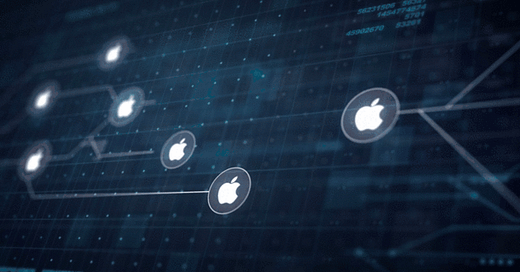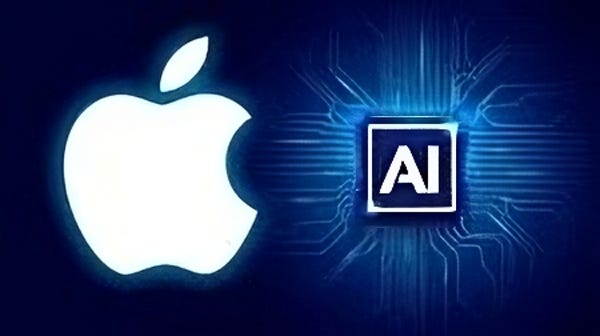(SPECIAL NOTE : Since publication of this piece, I’ve written a piece on how Apple is ahead of the tech industry on the global quest for “An Everything App”. Ties to the case here on Apple’s Opportunities ahead with AI and related technologies).
Ever since OpenAI’s ‘ChatGPT’ moment last November, and its seminal $12 billion plus partnership with Microsoft around foundation LLM AI models GPT 3, 4 and beyond, one of the persistent industry questions has been ‘Where is Apple?’ and what are they doing around AI?’ As far as AI is concerned, is it ‘Wither Apple’ or ‘Whither Apple’?
While Google and others had their reported ‘Code Red’ moments, Apple seemed to be going through a phase of ‘What, me worry?’
While the CEOs of Google and Microsoft Sundar Pichai and Satya Nadella, seemed to be almost trying to compete with each other on how many times they could say ‘AI’ at their respective Developer conferences this year, Apple blissfully never said the words once at WWDC 2023. The closest they came was ‘Machine Learning’, and it wasn’t even their CEO Tim Cook.
We got the beginning of some possible answers today, with this Bloomberg report on an ‘Apple ChatGPT’ project named Ajax:
“Apple Inc. (AAPL) is quietly working on artificial intelligence tools that could challenge those of OpenAI Inc., Alphabet Inc. (GOOGL)’s Google and others, but the company has yet to devise a clear strategy for releasing the technology to consumers.”
“The iPhone maker has built its own framework to create large language models — the AI-based systems at the heart of new offerings like ChatGPT and Google’s Bard — according to people with knowledge of the efforts. With that foundation, known as “Ajax,” Apple also has created a chatbot service that some engineers call “Apple GPT.”
“In recent months, the AI push has become a major effort for Apple, with several teams collaborating on the project, said the people, who asked not to be identified because the matter is private. The work includes trying to address potential privacy concerns related to the technology.”
Apple’s long time and very public commitment to user Privacy has been viewed by many industry observers as a key reason they are not likely to be successful with AI. After all, I’ve discussed how ‘Reinforcement Learning Loops’ from user queries, is a critical way to make LLM AI applications perform with great reliability and accuracy at scale.
Apple does have technical tricks up their sleeves here using technologies like ‘differential privacy’ and special, stand-alone on device processors that keep user data separate and secure.
But there is no question that Apple has more self imposed headwinds here than companies like Google, Meta, Microsoft, Amazon, and others when Privacy imperatives are concerned. But they also have a unique repository of user Data that can fundamentally recreate the value proposition around AI. They should be able to thread the privacy and data needle. And that’s needed, especially as it’s a top AI issue for regulators around the world.
While Apple might not have had an externally perceived ‘Code Red’ around AI, Bloomberg goes on to describe their internal deliberations:
“Behind the scenes, Apple has grown concerned about missing a potentially paramount shift in how devices operate. Generative AI promises to transform how people interact with phones, computers and other technology. And Apple’s devices, which produced revenue of nearly $320 billion in the last fiscal year, could suffer if the company doesn’t keep up with AI advances.”
“That’s why Apple began laying the foundation for AI services with the Ajax framework, as well as a ChatGPT-like tool for use internally. Ajax was first created last year to unify machine learning development at Apple, according to the people familiar with the effort.”
The initiative leverages external AI and other cloud infrastructure:
“Apple’s Ajax system is built on top of Google Jax, the search giant’s machine learning framework. Apple’s system runs on Google Cloud, which the company uses to power cloud services alongside its own infrastructure and Amazon.com Inc. (AMZN)’s AWS. “
“The company has already deployed AI-related improvements to search, Siri and maps based on that system. And Ajax is now being used to create large language models and serve as the foundation for the internal ChatGPT-style tool, the people said.”
More broadly,
“Beyond the state of the technology, Apple is still trying to determine the consumer angle for generative AI. It’s now working on several related initiatives — a cross-company effort between its AI and software engineering groups, as well as the cloud services engineering team that would supply the infrastructure for any significant new features. While the company doesn’t yet have a concrete plan, people familiar with the work believe Apple is aiming to make a significant AI-related announcement next year.”
People-wise under CEO Tim Cook, the AI initiative falls under a long time Apple executives:
“John Giannandrea (JG), the company’s head of machine learning and AI, and Craig Federighi, Apple’s top software engineering executive, are leading the efforts. But they haven’t presented a unified front within Apple, said the people. Giannandrea has signaled that he wants to take a more conservative approach, with a desire to see how recent developments from others evolve.”
“The company expanded its artificial intelligence efforts in 2018 with the hiring of Giannandrea, who previously led search and AI at Google. Since then, Apple hasn’t released many splashy new AI features, but at least two initiatives could help put it on the map.”
“The company is planning a new health coaching service codenamed Quartz that relies on data from an Apple Watch and uses AI to personalize plans, Bloomberg reported in April. And the company’s future electric car will use artificial intelligence to power the vehicle’s self-driving capabilities.”
I’ve felt for a long time that Apple has the best set of opportunities in AI and ample time to play their cards right. I’ve talked about their AI opportunities with their upcoming Vision Pro platform, especially vs Meta, and its pricing issues notwithstanding.
I’ve been talking about their opportunities with ‘AI at the edge’ on over 2 billion local devices. Just yesterday, I discussed their potential opportunities with open source models on local devices, after Meta’s Llama 2 announcement;
“AI at the Edge is particularly important since Meta’s LLaMA 2 is small enough to run on local devices closer to users, and not depend primarily on the cloud for reinforcement learning, inference and training loops.”
“In fact, Meta in its announcement highlighted that they’re working with Qualcomm to ensure LLaMA 2 can run natively on phones and other devices rather than being Cloud dependent.”
“One can see companies like Apple experimenting with LLM AI in this direction on Apple Silicon in the hands of over 2 billion users using Macs, iPads and iPhones. With dozens of commercial open source LLM AI models on the smaller side available, Apple too has a lot of choices ahead.”
“It’s not even out of the question for OpenAI to potentially decide to open source their smaller parameter sized GPT3 and/or GPT 3.5 models for such applications via Partners. Counter-moves like that are possible vs what Meta is doing with OpenAI’s equity partner Microsoft.”
Will go through this more in future posts. Suffice it to say that in prior Tech waves and in AI, it’s not necessary to be the first mover , but a fast follower and definitely an out of the box innovator, whenever one enters the game.
Note Google wasn’t even a company until 1998, three years after Internet commercialization kicked off with the ‘Netscape moment’ in 1995, and Microsoft didn’t hit its stride in PCs until Windows 95, over a decade after the PC wave had kicked off. And Amazon, as we’ve discussed in earlier posts, didn’t get going years after its founding with its famous execution around their Flywheel at scale starting in 2002.
Apple is not a late comer to AI in my view. But possibly the best positioned company to leverage AI technologies as the core underlying AI infrastructure tech is figured out. Smart personalized AI agents and all.
And it’s because they are uniquely positioned in a unified way at Scale, where billions of customers are. Complete with unique hardware, software and user experience sensibilities. One already sees that in what they’ve done with the nascent Vision Pro platform. The AI game has barely begun for Apple. Stay tuned.
(NOTE 1: Since publication of this piece, I’ve written a piece on how Apple is ahead of the tech industry on the global quest for “An Everything App”. Ties to the case here on Apple’s Opportunities ahead with AI and related technologies)
(NOTE 2: This post as others on this site discuss these issues from an information perspective only. No investment advice is implied at any time).




